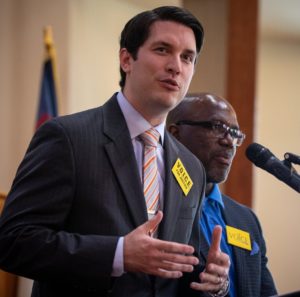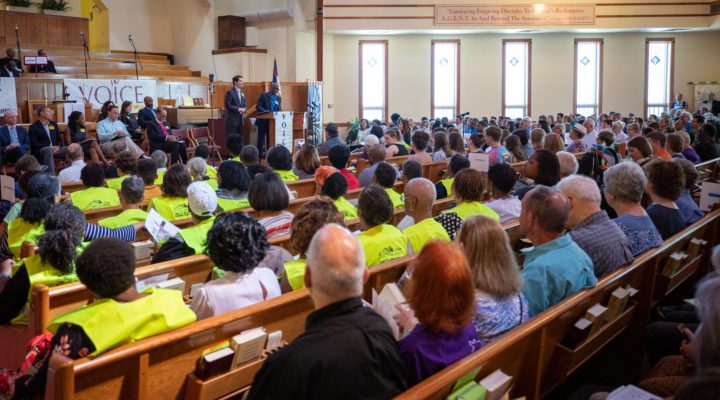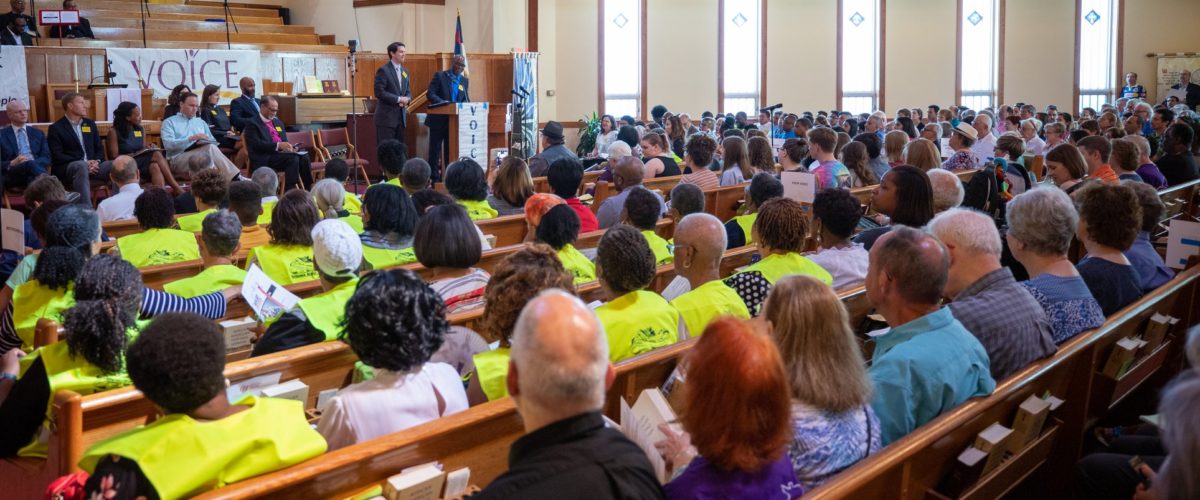I don’t know about you, but every day I’m receiving more and more messages from friends and family about the upcoming presidential election. Since I’m a pastor, the messages sent to me tend to focus on how either Donald Trump or Joe Biden will best protect Christians and Christian values. Both my liberal and conservative friends feel their values, worldview and way of life are under attack from the other side. That’s why I need to vote for their candidate in November. [Insert name] is the only one who can save us in this time of trouble.
 The campaign trail only reinforces these narratives of weakness, vulnerability and fear. Both candidates baptize their speeches in religious rhetoric to tell supporters they will protect their Christian tribe from attack. While it is soothing to hear messages of support from candidates, these public appearances are simply acts of performative piety for political gain.
The campaign trail only reinforces these narratives of weakness, vulnerability and fear. Both candidates baptize their speeches in religious rhetoric to tell supporters they will protect their Christian tribe from attack. While it is soothing to hear messages of support from candidates, these public appearances are simply acts of performative piety for political gain.
I can’t help but think of the temptation of Jesus in the desert when Satan shows him all the kingdoms of the earth and says, “To you I will give their glory and all this authority … . If you worship me, it will all be yours.” The temptation is for Jesus to accept the status quo of a violent and wicked world, to acknowledge that selfishness and oppression prevail, and then conform to it. He can be the strong man vanquishing his foes just like every other dictator who has walked the earth. Jesus, of course, resists this temptation. But what if he had said “yes”?
That’s essentially the question politicians on the campaign trail ask of churches. The bargain is simple: Churches give politicians votes, politicians give churches access to power to shape the country around their particular set of social issues. Conservative Christian leaders have traded votes in hopes of winning their culture war against gay marriage, abortion and immigration. The Republican Party has used these votes to increase income inequality, reduce protections for workers and consumers and dismantle social safety nets.
But it’s not like the Democrats are the heroes their Christian supporters often portray them to be. The bargain the party has made with liberal Christians is to make progress on marriage equality, expanding health care and increasing funding to public services. In exchange, the Democratic Party has used its votes to consistently bail out Wall Street instead of Main Street, allow technology tycoons to create monopolies and bust unions, and leave behind millions in building a global economy that really just widened global inequality.
It’s time for Christians to let go of the idea that any particular political party should be promoted in order to protect them. We no longer can tolerate using the pulpit as a platform to tell people to vote for a candidate who only offers empty promises in exchange and whose priority is getting elected, not expanding the kingdom of God.
Decades of witnessing the culture wars ravage our society have left many people, especially younger generations, tired of churches using their bully pulpits to focus on sex, guns and money instead of the issues the Bible prioritizes clearly and consistently: caring for the poor and the oppressed, establishing justice and equity in the court system, ending the exploitation of workers.
Jesus resisted the temptation of power in the desert not only because he was the Son of God, but because he was rooted in the prophetic values and witness of Scripture. In the economy of the Bible, power is shared, egalitarian and unlimited.
“The church must reclaim an uncompromising prophetic spirit that says “no” to the temptation in the desert as Jesus did.”
This is the heart of the story of Pentecost: the power of the Holy Spirit is shared amongst a diverse community of people and is never exhausted as the movement grows. We are invited to experience the power of the Spirit to guide and drive our own work of building a beloved community of justice, love and mercy for all.
The church must reclaim an uncompromising prophetic spirit that says “no” to the temptation in the desert as Jesus did. We cannot align ourselves with political power for personal gain. Churches must stand outside the political party system in order to hold both sides accountable.
This is not a rally cry to end our public witness or cease political engagement. Quite the opposite. Our democracy depends on actively engaged citizens. In a healthy democracy, citizens use their right to vote as a way of holding elected officials accountable for taking action on the issues that matter most to their communities. It’s not a matter of if churches should be involved in this work, but why and how.
The prophetic spirit of Pentecost challenges us to care for everyone in our communities, not to advance our own parochial agendas. We have to stop bartering for exclusive power in the desert of fear and embrace a public witness that seeks the welfare of the cities we are called to serve (Jeremiah 29:7).
I have learned this lesson time and again through my work in VOICE — a multifaith, multiracial coalition of more than 50 faith communities and civic organizations in Northern Virginia. We’re working together to build power in middle- and low-income communities to make real change on issues such as criminal justice reform, public education and affordable housing.
In VOICE, I have the honor and pleasure of working with people across the political and religious spectrum. Our work is rooted in listening to people, often 2,000 to 5,000 people at a time. I can tell you that there are so many issues that cut across the political divide: we all want good schools for our kids, good jobs paying living wages and a safe place to call home.
Politicians on the campaign trail like to tell us that we all want different things and that power is a zero-sum game: the more I have, the less you have, so we have to fight amongst ourselves for scraps. But I believe a better world is not only possible, but we already have everything we need to build it.
“Our neighbors are desperate to see a way past the culture wars, for someone to lead a way forward where we can heal and restore, build up and tear down, plant and grow.”
If we focus our attention and our efforts on caring for the poor, defending the oppressed and protecting the vulnerable as Jesus calls us to, then we will discover God at work in our lives in new and surprising ways. We will free ourselves from the false narratives of scarcity and fear, only to discover God providing everything we need in abundance.
Stop listening to political platforms and start listening to your neighbors, especially those who are different from you. Listen to their stories and what they care about. Find those places of resonance with your own experience and the work God calls us to do. Then go out into the world together and do something about it, holding public officials accountable when necessary regardless of their political party.
Our neighbors are desperate to see a way past the culture wars, for someone to lead a way forward where we can heal and restore, build up and tear down, plant and grow.
As Alice Walker writes, “We are the ones we have been waiting for.” Because we are the ones God has called to mission and ministry. We are the ones God has given “a spirit not of fear but of power and love” (2 Timothy 1:7). May we recapture the sacrificial prophetic spirit of Jesus and join God in changing the world.
Austin Almaguer serves as lead pastor at Vienna Baptist Church in Vienna, Va. He earned a bachelor of arts degree in religion from Baylor University and later a master of divinity degree from Princeton Theological Seminary with a focus on the intersection of theology and social justice. He serves in leadership for VOICE (Virginians Organized for Interfaith Community Engagement) and is an active board member of the District of Columbia Baptist Convention and former member of the Coordinating Council of the Cooperative Baptist Fellowship of Virginia.


